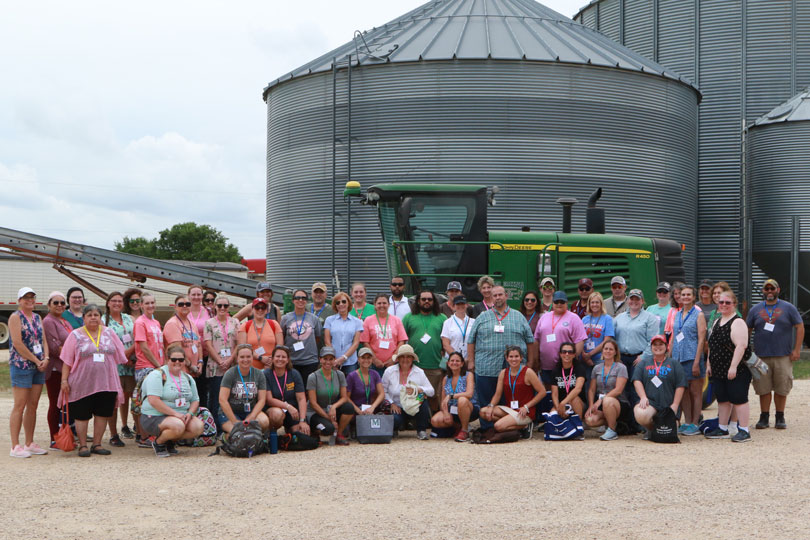By Julie Tomascik
Editor
Although school may be out, class was in for nearly 50 teachers who attended Texas Farm Bureau’s Summer Agricultural Institute in early June.
For 25 years, the professional development event has helped take the mystery out of agriculture for Texas teachers.
“No matter the subject, agriculture has a place,” Dakota Fleming, Texas Farm Bureau associate director of Urban and Educational Outreach, said. “We find a way to incorporate agriculture into what they’re already teaching. It’s not an extra step for them but rather an enhancement to their curriculum.”
Many students are several generations removed from the farm and ranch. The program helps teachers learn how to dispel common myths and incorporate agriculture into their curriculum to increase agricultural literacy and awareness.
Farm visits, entomology and science lessons, agricultural tours and more were on the agenda to help teachers better understand agriculture.
“I think one of the most important things that I can take away from this is that even though I work in a more urban area, it doesn’t mean that you can’t get into agriculture. It doesn’t mean you can’t go and make a difference in the future,” Michael Denoy, environmental science teacher at Graham Curry Independent School District, said.
He teaches students in kindergarten through fifth grade. The activities throughout the week gave Denoy additional material to take back to his classroom.
“In class, we talk about conservation, renewable energy resources, methane gas,” Denoy said. “We learned a lot about cattle—like understanding that cattle are not the primary contributors of carbon emissions. I can take that information back to my students.”
Participating teachers heard from a beef cattle veterinarian, Master Gardeners, the U.S. Department of Agriculture’s Natural Resources Conservation Service and the Texas Wildlife Association. They also toured a livestock nutrition facility in Cameron.
“We learned a little about soil. We learned about beef and about farming,” Paige Smith, a Lampasas High School physics and anatomy teacher, said. “We learned about what cattle eat and were able to touch some of that, too.”
Teachers also visited a farm and ranch in Bell County to learn about the science involved in growing corn and also watched farmers harvest wheat.
“I learned a lot and have a lot to take home to my students. The hands-on activities taught me a lot—being able to see it, do it, feel it, taste it, smell it. The kids will learn from that, too,” said Jessica Lee, a third grade science and social studies teacher at Grandview Elementary. “I did bring a colleague with me, so we plan to get together with all of our science teachers from all the grades to see what we can add to our school and our garden.”
This year, teachers also grilled their own steaks in a session with the Texas Beef Council. They learned about proper food safety handling and how to grill a steak.
“Grilling steaks was a fun experience to add this year, and it also brought the beef cycle full circle from pasture to plate,” Fleming said.
For some, the institute was a complete learning experience that offered them viewpoints and information they hadn’t been exposed to before.
“I didn’t know how beef got to my table,” Lee said. “I never knew that there were different people who raised them at different times, and then on top of that, how incredibly smart every one of those farmers are with all of those machines they use. It’s incredible.”
Fleming also noted the program sparked and renewed a passion for agriculture among the teachers that benefits their students.
“Not only is their knowledge level increased, but the level of engagement and the level of rigor and relevance that they will get in agricultural lessons and tying that to science, math, language arts, history and environmental science greatly benefits students,” Fleming said.
The four-day professional development seminar was held in Waco June 3-6. Teachers also earned continuing professional education credits.
For more information on the institute and other opportunities for teachers, visit www.texasfarmbureau.org/aitc.

